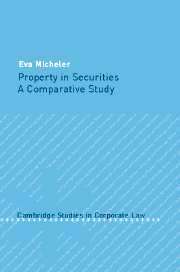Book contents
- Frontmatter
- Contents
- Preface
- Table of legislation
- Table of cases
- Introduction
- 1 Convergence and path-dependence
- Part I English law
- 2 Paper transfers
- 3 Dematerialisation
- 4 Impact on the institutional framework
- 5 Defective issues
- 6 Unauthorised transfers
- 7 Indirect holdings
- 8 Conclusions on English law
- Part II German and Austrian law
- Part III Conclusions
- Select bibliography
- Index
8 - Conclusions on English law
from Part I - English law
Published online by Cambridge University Press: 28 July 2009
- Frontmatter
- Contents
- Preface
- Table of legislation
- Table of cases
- Introduction
- 1 Convergence and path-dependence
- Part I English law
- 2 Paper transfers
- 3 Dematerialisation
- 4 Impact on the institutional framework
- 5 Defective issues
- 6 Unauthorised transfers
- 7 Indirect holdings
- 8 Conclusions on English law
- Part II German and Austrian law
- Part III Conclusions
- Select bibliography
- Index
Summary
Part I of the book analysed the English law of securities. English securities are issued predominantly in the form of registered securities. They do not constitute negotiable instruments. Securities certificates are documents of evidence only. When securities first appeared in England they were transferred by way of novation. This doctrinal mechanism has sent English law down a path on which it has remained since then. The transfer procedure that was in place when securities first emerged reflects the law of novation and has shaped transfer procedures that have been adopted ever since, all the way down to the rules that govern uncertificated securities.
In England, property rights in securities are deeply imbedded in the path adopted by English private law. England approaches property rights in securities from the perspective of its historically determined dual-headed jurisdiction at law and in equity. An investor becomes the owner at law when her name is entered on the securities register. It is possible for an investor to acquire equitable title to the securities prior to that; equitable title, however, vests in the buyer only if a trust is created in her favour either by operation of law or by an express declaration. Neither ownership at law nor ownership in equity are enforceable through an action that would establish that the claimant has absolute title to the securities. Property rights in England are established only as between the parties who participate in the respective litigation.
- Type
- Chapter
- Information
- Property in SecuritiesA Comparative Study, pp. 141 - 144Publisher: Cambridge University PressPrint publication year: 2007

